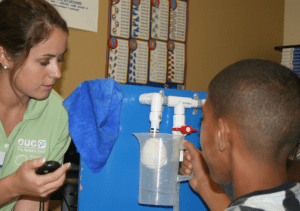Catalina Elementary School student Eboni Brice-Johnson carefully turns on the plastic faucet, sets the timer for 20 seconds and observes the water flow difference between a low-flow and a standard showerhead. She compares the water in the two beakers and notes that the low-flow showerhead uses 800 milliliters (mL) less water that the standard one. Eboni is among 7,500 Central Florida fifth graders who are learning first-hand about water and energy conservation, thanks, in part, to an educational program sponsored by OUC – The Reliable One and the Orlando Science Center. An added bonus, students gain the knowledge and skills that will prepare them for the science portion of their FCAT.

The Alternative Water and Energy Supply; Observation, Methods and Education (A.W.E.S.O.M.E.) Project educates students about water supply and sustainability, as well as alternative energy. Orlando Science Center instructors deliver hands-on, interactive curriculum to nearly 7,500 fifth- grade students at 56 public schools in Orange and Osceola counties. From building a model aquifer … to running tests to assess the efficiency of low-flow showerheads … to playing the “H2O Smarts” game about water conservation, the educators bring fun experiments to classrooms.
“The lessons complement what we’re teaching in school about the water cycle,” said Sarah Braymer, fifth-grade teacher at Catalina Elementary. “These hands-on activities keep the kids engaged while preparing them for the FCAT. It’s like having an in-house field trip!”
The OUC-funded program, which is in its third year, is aligned with the Sunshine State Standards and academic benchmarks set forth by the Florida Department of Education. The 90-minute workshops and labs are delivered to every Orange and Osceola county public school classroom within OUC’s electric and water service territories. During the fall semester, the course emphasizes water sustainability; in the spring, it focuses on alternative energy. According to post-test assessments, more than 60 percent of the children demonstrate improvement in science skills after the lessons.
“Encouraging sustainable habits in children will have a positive impact on our efforts to conserve natural resources now and in the future,” said Roseann Harrington, OUC Vice President of Marketing, Communications and Community Relations. “The A.W.E.S.O.M.E. Project promotes the concepts of conservation and alternative resources in our community’s classrooms in a way that appeals to today’s students. This is an incredible collaboration in science learning.”
See more information about the project here: http://www.youtube.com/watch?v=jyQGxGQ3JWs


